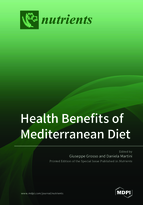Health Benefits of Mediterranean Diet
A special issue of Nutrients (ISSN 2072-6643).
Deadline for manuscript submissions: closed (30 March 2019) | Viewed by 203418
Special Issue Editors
Interests: coffee; meta-analysis; Mediterranean diet; polyphenols; polyphenol-rich foods
Special Issues, Collections and Topics in MDPI journals
Interests: nutrition; diets; sustainability; food labelling; food quality
Special Issues, Collections and Topics in MDPI journals
Special Issue Information
Dear Colleagues,
Growing evidence shows that a dietary pattern inspired by Mediterranean diet principles is associated with numerous health benefits. A Mediterranean-type diet has been demonstrated to exert a preventive effect toward cardiovascular diseases, in both Mediterranean and non-Mediterranean populations. Part of these properties may depend on a positive action toward healthier metabolism, decreasing the risk of diabetes and metabolic-syndrome-related conditions. Some studies also suggested a potential role in preventing certain cancers. Finally, newer research has showed that a higher adherence to the Mediterranean diet is associated with a lower risk of cognitive decline, depression, and other mental disorders. Overall, a better understanding of the key elements of this dietary pattern, the underlying mechanisms, and targets, are needed to corroborate current evidence and provide insights on new and potential outcomes.
This Special Issue welcomes original research and reviews of literature concerning the Mediterranean diet and various health outcomes:
- Observational studies on established nutritional cohorts (preferred), case-control studies, or population sample on the association with non-communicable diseases;
- Level of evidence on the association with human health, including systematic reviews and meta-analyses;
- Evaluation of application of Mediterranean diet principles in non-Mediterranean countries;
- Description of mechanisms of action, pathways, and targets at the molecular level, including interaction with gut microbiota.
Dr. Daniela Martini
Guest Editors
Manuscript Submission Information
Manuscripts should be submitted online at www.mdpi.com by registering and logging in to this website. Once you are registered, click here to go to the submission form. Manuscripts can be submitted until the deadline. All submissions that pass pre-check are peer-reviewed. Accepted papers will be published continuously in the journal (as soon as accepted) and will be listed together on the special issue website. Research articles, review articles as well as short communications are invited. For planned papers, a title and short abstract (about 100 words) can be sent to the Editorial Office for announcement on this website.
Submitted manuscripts should not have been published previously, nor be under consideration for publication elsewhere (except conference proceedings papers). All manuscripts are thoroughly refereed through a single-blind peer-review process. A guide for authors and other relevant information for submission of manuscripts is available on the Instructions for Authors page. Nutrients is an international peer-reviewed open access semimonthly journal published by MDPI.
Please visit the Instructions for Authors page before submitting a manuscript. The Article Processing Charge (APC) for publication in this open access journal is 2900 CHF (Swiss Francs). Submitted papers should be well formatted and use good English. Authors may use MDPI's English editing service prior to publication or during author revisions.
Keywords
- mediterranean diet
- non-communicable diseases
- global
- evidence








